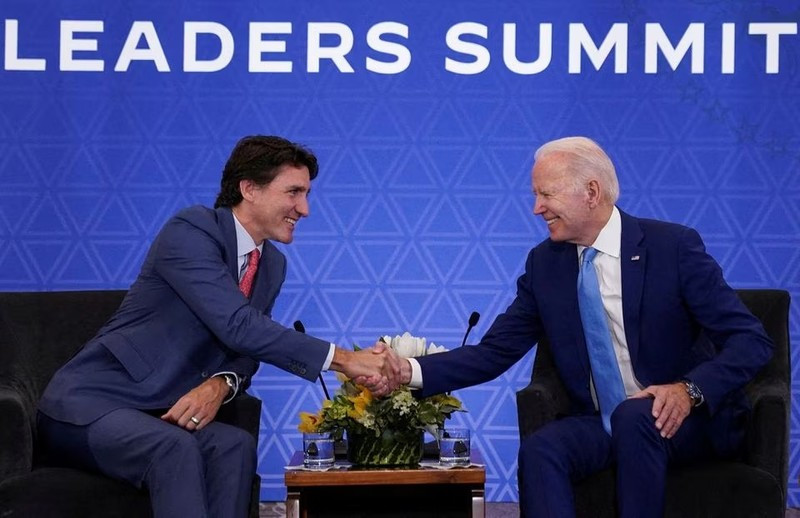This is an opportunity for the two sides to consider pressing issues facing both countries and at the same time, strengthen the alliance relationship.
This is President Biden's first official visit to the neighbouring country since he took office in 2021. Although the trip is considered belated, it is considered an appropriate time for the two sides to discuss important issues in bilateral and international relations.
Important issues in bilateral relations
Defence and security cooperation, promoting trade cooperation, clean energy and working together to prevent immigration, are the areas where the leaders of the US and Canada focused discussions.
Canada has pledged to spend 40 billion CAD over 20 years to upgrade the North American Aerospace Defense Command (NORAD) defences, including receiving and transferring the over-the-horizon radar system and buying F-35 fighter jets, from the US.
The over-the-horizon radar system will help extend NORAD's surveillance capabilities further north and could detect new foreign threats in the Arctic.
Cooperation between the US and Canada to stem the flow of immigrants is also an issue of special concern to both sides.
Meanwhile, cooperation between the US and Canada to stem the flow of immigrants, is also an issue of special concern to both sides, in the context that the two North American countries are under pressure to tackle the growing problem of illegal immigration.
The flow of asylum-seekers into Canada from the US has spiked, reaching nearly 40,000 last year, many passing through an unofficial border crossing at Quebec's Roxham Road. According to statistics from the US, the number of people trying to illegally cross the border from Canada into the US has also doubled.
This situation put the Safe Third Country Agreement on the agenda, during the meeting between the US and Canadian leaders. The agreement stipulates that individuals who have transited through a country where they could’ve made an asylum claim because it’s deemed safe, as the name of the agreement implies. It’s in effect at ports of entry, and individuals entering at a land port of entry may be ineligible to make a claim and be returned to the US.
But Roxham Road is not an official crossing, meaning that people who transit there could still seek protections in Canada, even though they passed through the US. The Canadian province of Quebec has become an overloaded hotspot for refugee flows.
In this regard, Prime Minister Trudeau once said that the only way to effectively shut down, not just Roxham Road, but the entire border to these irregular crossings, is to renegotiate the Safe Third Country Agreement. However, this is not an easy problem to solve because Canada and the US have the longest land border in the world, nearly 9,000 km and there are many unofficial crossings.
Opening up trade flows
Opening up the free trade flows between Canada and the United States is important to both countries. The trade relationship between the US and Canada has long been subject to many disagreements.
At the end of 2021, Canadian Prime Minister Justin Trudeau instructed his top economic ministers to take tough positions on trade issues, amid growing disputes with the US.
However, these disagreements have been overshadowed by the major global challenges facing the two countries. As such, the United States – Mexico – Canada Agreement (USMCA), is said to be a "fundamental pillar" of Washington and Ottawa's efforts, to promote cooperation for the common good.
Canada wishes to strengthen cooperation with the US in several areas, such as electric vehicles, automobiles, and minerals. Canada is currently heavily dependent on trade relations with the US. This relationship is especially important in the context of the volatile world situation, including the Ukraine conflict.
Statistics show that the value of trade between Canada and the US in goods and services in 2021, will reach 1 trillion CAD (nearly 770 million USD), making the US the largest trading partner of Canada. Canadian companies operating in the US are directly employing 634,000 Americans.
In addition, promoting North American trade helps countries in the region reduce their dependence on imports from other parts of the world, especially semiconductor components from Asian countries.
In fact, since the outbreak of the COVID-19 pandemic in 2020, industrial production in the US, Canada and Mexico, has been severely stalled due to disruptions in the supply chain of electronic components, especially from countries in Asia, causing significant damage to the GDP of these three countries, with the world's leading industrial development.
The US, Mexico and Canada said they would take steps to strengthen the North American semiconductor industry. They also plan to establish operational standards and electric vehicle charging stations along international borders, as well as develop a clean hydrogen market in North America.
The three countries have pledged to reduce methane emissions from solid and liquid waste, by at least 15% from 2020 levels, by 2030. In terms of the transition to clean energy and critical minerals strategy, subsidies granted in the Inflation Reduction Act to the US electric battery sector, remain a huge source of concern in Canada.
There are still some problems, but with a series of important issues in the mutual and strategic relationship of the two countries as neighbours and allies, the US and Canada are taking every opportunity to improve their relationship. In the context of increasing global uncertainties, the two sides continue to work together to protect common values, for the benefit of both sides.
















